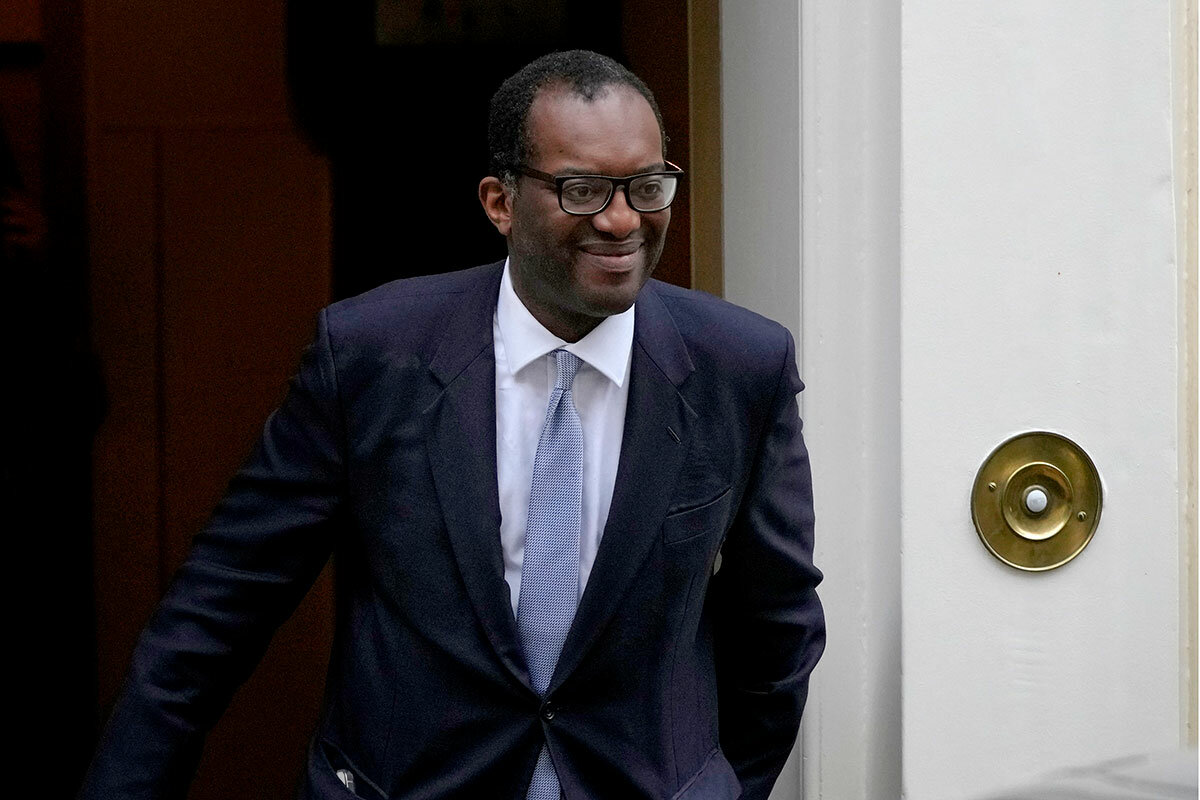When leaders don’t listen: Lessons from Liz Truss’ rise and fall
Loading...
| London
Even by the tumultuous standards of recent British politics – with three prime ministers in as many years – the rise and fall of the latest leader, Liz Truss, has been extraordinary.
It has been dizzyingly quick. It has damaged not just her reputation, but Britain’s economy.
It has also been almost entirely self-inflicted – which is why it carries important implications for Britain and other democracies such as the United States as well as autocracies like Russia and China.
Why We Wrote This
A story focused onLeaders so sure of themselves that they do not listen to opposing views are shirking their responsibility to govern wisely, whether they be in London, Washington, Moscow, or Beijing.
That’s because the main reason Ms. Truss now finds herself scrambling to keep her job isn’t so much because of what she has done: her “supply-side” package of tax cuts and new spending without clear explanation of how to pay for it.
It’s because of something she hasn’t done: listen. More specifically, listen to voices of criticism or caution before launching her plan.
From the moment she entered Downing Street just six weeks ago, she has shut doubters out or shrugged them off. And that has denied her an invaluable corrective tool for anyone in government, especially at the top – a sounding board.
Her new finance minister’s wholesale abandonment on Monday of Ms. Truss’ original plan suggests she has now learned that lesson, though a growing number of her own Conservative Party colleagues are suggesting she has been too damaged politically to keep her job for much longer.
Monday’s unprecedentedly comprehensive U-turn was a culmination of events that started last Friday, when the prime minister fired her original finance minister, Kwasi Kwarteng. Now, she has had to sign on to a diametrically different approach by his successor, the more centrist veteran cabinet minister Jeremy Hunt.
Mr. Hunt announced he was canceling almost all the tax cuts. He was also time-limiting a multibillion-pound government support package to help people pay their rising energy bills, which Ms. Truss had vowed would last for two years. And he warned of budget cuts to avoid major new government borrowing.
His message was aimed at the financial markets. Their thumbs-down on the Truss plan had driven up interest rates, not just for the government but millions of British mortgage holders, while dragging down the value of the British pound.
The initial market response to Mr. Hunt’s reversal was the equivalent of a giant sigh of relief. Interest rates on government borrowing eased, and the pound began heading back upward.
Yet the difference between his approach and Ms. Truss’ ran deeper than economic policy.
Fundamentally, it was about listening. Consulting. Subjecting decisions to the filter of voices belonging to those with different expertise and experience, and those affected by what was ultimately decided.
One of Mr. Kwarteng’s first moves in office had been to sack the top civil servant in Britain’s treasury department. Before announcing the policy package that he and Ms. Truss had designed, neither of them bothered with the traditional pre-budget consultation with the Bank of England, Britain’s equivalent of the Federal Reserve.
They also dispensed with an analysis by the independent Office of Budget Responsibility of what the new plan would cost, how it would be paid for, and how much additional borrowing it would require the British government to take on.
These short circuits meant their policy announcement struck markets as ill thought out and very possibly unsustainable – less a rigorously developed plan than a back-of-the-envelope draft.
There’s a profound irony in this for Ms. Truss. If she had listened to advice, she might well have been able to retain the core ideological thrust of her policy, yet time tax cuts and expenditures in such a way, and explain them with sufficient credibility, that markets would not be spooked.
The longer-term lesson, however, is that the core responsibility of any government – to protect and ideally improve the day-to-day lives of the governed – risks being undermined if leaders are cut off from policy opinions, experience, and expertise other than their own.
And not just in Britain.
Ms. Truss’ dismissal of civil servants and other analysts as mere “bean-counters” echoes an increasing trend among populist-minded leaders in Western democracies, characterizing all experts as tunnel-vision elitists, allegedly part of an unaccountable “deep state.”
That’s a political judgment, but with real-world policy effects. One example is the way in which former U.S. President Donald Trump shrugged off experts’ warnings during the early months of the COVID-19 pandemic, preferring to repeatedly play down its seriousness.
Neither are autocrats immune. Russian President Vladimir Putin rolled his tanks into Ukraine in the clear expectation of a fairly easy victory, ignoring skeptical voices. The result has been the battlefield morass in which his forces now find themselves.
In China, where leader Xi Jinping is being formally endorsed this week as the most powerful leader since Mao Zedong, the policy effects are also evident. There is no more striking example than the lockdowns, affecting hundreds of millions of people, through which he has been pursuing his goal of “zero COVID.”
Had Mr. Xi listened to experts outside his inner circle, he would surely have updated and modified his policy so as to minimize the disruption to people’s lives.
But in the evolving politics of China, where Mr. Xi has become recognized as the sole embodiment of all political, historical, and social wisdom, alternative voices have been facing a lockdown of their own.
There is no room for diverse opinions in an echo chamber, whether in London, Moscow, or Beijing.







